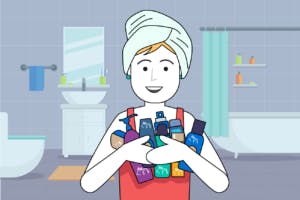I once heard someone say she couldn’t abide animals suffering just so she could look pretty. That stuck with me, and at that moment I made the decision that I would do my damndest to switch to beauty products that are cruelty free. And I’m not alone. A Mintel survey shows that the number of vegan cosmetic launches doubled between 2013 and 2018. The popularity of vegan cosmetics is predominantly pushed by Millennials and Gen Z, as they are “more likely to follow a plant-based diet and are also more likely to actively seek out brands that use natural ingredients and adhere to ethical values, such as being fair trade.”
Once I decided to make the switch, I was successful in some of my efforts (shampoo, eye shadow, lipstick, for example) and not so much in others (face lotions with SPF). I’m not going to lie, even making a partial switch was a challenge.
Maybe that sounds kind of frivolous or silly (Really? Changing your beauty care line up is challenging?) but if you have any kind of routine that involves health or beauty care, think about it: Instead of reaching for old standbys and tossing them in your cart (physical or online) without a second thought, you’re hitting pause, spending time (sometimes a lot of time) researching, and then forking over sometimes triple what you were used to paying for the products you use every day (toothpaste, shampoo, mascara, face wash, to name a few; the list is extensive), well…yeah. It’s a big mental switch, and it can be a challenge. What’s more, the number of products that are cruelty free aren’t huge (though thankfully that’s rapidly changing), and tracking them down can add another challenge to add to the mix.
And then I heard something that could make all of this a lot easier—CoverGirl is going cruelty free.
To be honest, I don’t use a lot of CoverGirl products, neither now nor in the past, but the fact that one of the biggest and long-standing beauty brands on the market is taking this leap(ing bunny) is big. Not only is it shining a light on a designation that is increasingly important with many consumers, it’s bringing what was once the bastion of high-end (re: high price tag) or specialty products to the more cost-conscious consumer. Because while I love my blush that I know wasn’t tested on animals, I’m not wild about shelling out $20 for it. If I can shell out $10 instead? Sign me up. And if I can pick it up in my local Walgreens when I’m out running errands, rather than order it online and wait a couple days for delivery? Even better.
It’s nice to know that CoverGirl is listening to its consumers. The company, according to a post on FleetStreet.com, wanted to “make cruelty-free cosmetics a ‘mainstream reality’” and they were “driven by the fact that animal testing is unnecessary” and “many of our consumers feel the same way.” The article goes on to cite a 2017 survey that shows 32 percent of consumers would stop buying a brand if it was tested on animals. It shows that the broader trend of brands engaging with their consumers, and actively seeking their input—and then acting on it—is no longer a trend, but a strategy that influences how companies can and will grow.
But this new announcement from Cover Girl will also, if I may be so blunt, introduce (sometimes unwelcomed) competition into the beauty market, especially when smaller brands are trying to make their voices heard to consumers—now they have to go up against a giant like CoverGirl.
But I think there’s some opportunity here, too. The parent brand of CoverGirl, Coty, partnered with Cruelty Free International to keep tabs on their commitment to producing cruelty-free products, and that promise from the parent company could be the key here. Coty owns a lot of different brands—maybe if they see that this new cruelty-free designation resonates with their consumers, that will trickle over into their other brands, if it hasn’t already. Or perhaps inspire them to seek out new brands that have already done the legwork to go cruelty-free and would be a brilliant new feather in their portfolio cap. (As it is, Coty has promised all their brands will go cruelty free by 2020). And simply competition in general is good for any industry, driving innovation, keeping costs in check, and more.
I’m curious to see how this will play out, and the effect that it will have on the beauty industry. And make no mistake—it will have an effect. Most immediately a pretty good one, of doing some good for animals and consumers alike.


